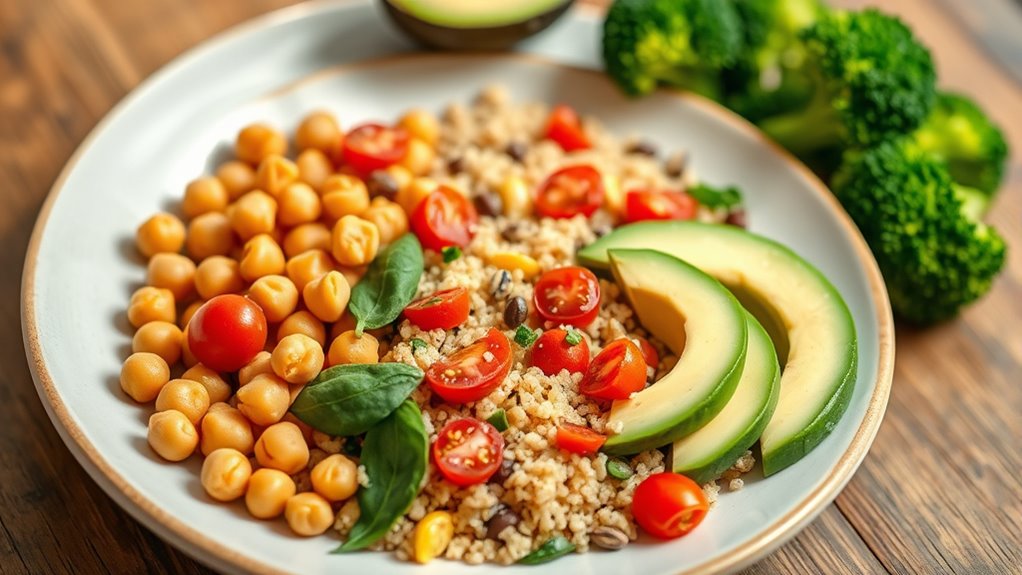During a 16:8 vegan intermittent fasting routine, you can rely on plant-based proteins like legumes, tofu, tempeh, nuts, seeds, and whole grains such as quinoa or amaranth to meet your needs. Protein powders like pea, rice, or hemp are convenient supplements, especially post-fast. Including vegetables with higher protein content, like kale and broccoli, adds variety. Combining these sources guarantees complete amino acids and supports muscle health. Keep exploring these options to optimize your nutrition during fasting windows.
Key Takeaways
- Prioritize plant-based proteins like legumes, tofu, tempeh, and edamame for complete amino acids during your eating window.
- Incorporate nuts, seeds, and whole grains such as quinoa and amaranth to boost protein intake and nutrient diversity.
- Use plant-based protein powders (pea, rice, hemp) post-fast to support muscle recovery and meet daily protein goals.
- Include high-protein vegetables like kale, spinach, broccoli, and cauliflower to enhance nutrient intake during meals.
- Strategically time protein consumption throughout the eating window to optimize muscle maintenance and blood sugar stability.
Legumes and Pulses: The Vegan Protein Powerhouses
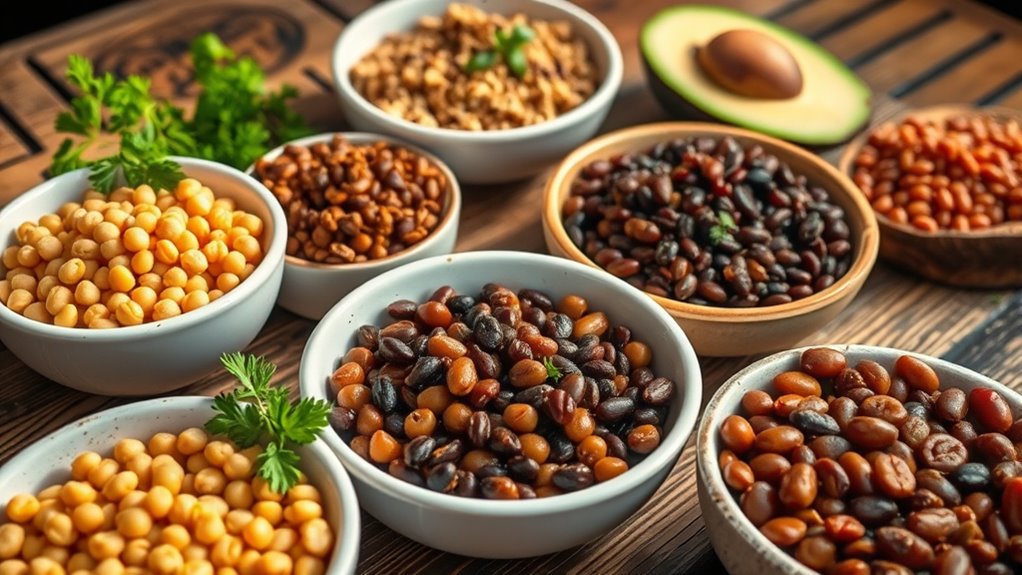
Legumes and pulses are essential components of a vegan diet, especially when it comes to meeting protein needs. They serve as versatile sources, including soy alternatives like tofu, tempeh, and edamame, which provide complete proteins. Fermented proteins, such as tempeh and miso, offer added benefits—they’re easier to digest and have enhanced nutrient absorption. Incorporating a variety of legumes and pulses ensures you get a good mix of amino acids, crucial for muscle repair and overall health during intermittent fasting. Plus, they’re affordable, filling, and easy to prepare, making them ideal for your meal planning. By including different types of legumes and pulses, you optimize your plant-based protein intake without relying on animal products. They’re a reliable foundation for your vegan fasting routine.
Nuts and Seeds: Nutrient-Dense and Satisfying Options
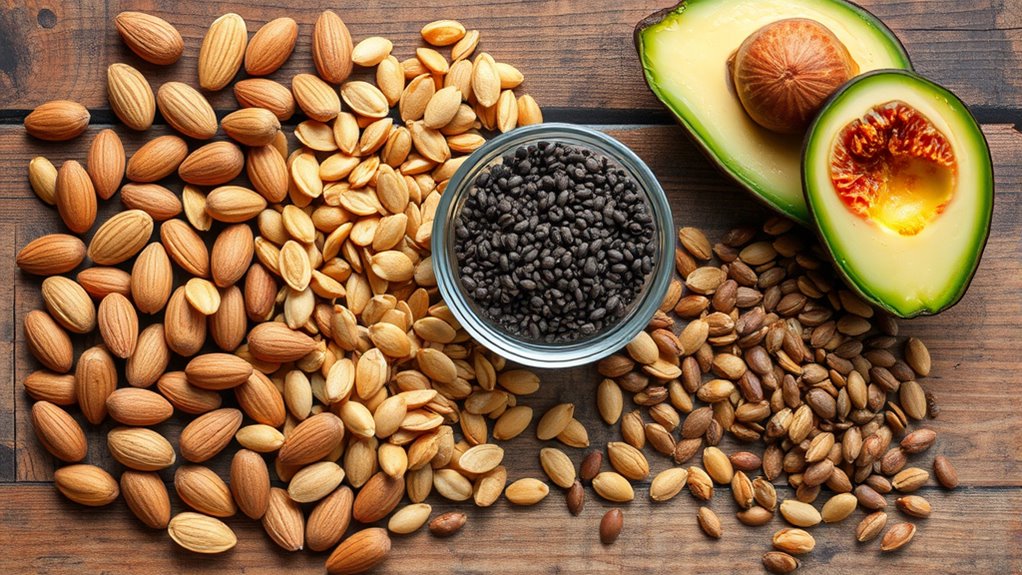
Nuts and seeds are nutrient-dense, satisfying options that can easily boost your vegan intermittent fasting routine. They offer healthy fats, protein, and fiber, making them perfect for quick, filling snacks during your eating window. Incorporate a variety of nut and seed varieties—like almonds, walnuts, chia seeds, and pumpkin seeds—to keep your diet diverse and enjoyable. Snacking strategies involving these options help curb hunger and stabilize blood sugar levels, reducing the temptation to overeat later. Keep portion sizes in check, as nuts and seeds are calorie-dense. Mix them into smoothies, sprinkle over salads, or enjoy them on their own. Their versatility makes them an excellent choice for maintaining energy and satiety during your 16:8 fasting schedule. Additionally, choosing protein-rich nuts and seeds can further support your dietary goals by ensuring adequate nutrient intake. Understanding the importance of nutrient density can help you select the most beneficial options for your health.
Whole Grains With a Protein Punch

Whole grains are an excellent plant-based source of protein that can easily be incorporated into your vegan intermittent fasting plan. Many gluten free grains, like quinoa and amaranth, provide complete proteins, making them valuable for your diet. Ancient cereal varieties such as spelt and millet also pack a protein punch, offering more than your typical refined grains. These grains not only boost your protein intake but also supply fiber, vitamins, and minerals essential for overall health. Incorporating a variety of these whole grains into your meals ensures you get diverse nutrients and amino acids. Utilizing natural materials such as linen or reclaimed wood in meal presentation or kitchen decor can enhance the farm-to-table vibe of your diet. Whether added to salads, soups, or as a base for meals, they’re versatile, satisfying options that support your fasting and muscle maintenance goals. Including these grains can also help you meet your protein needs more effectively during your fasting window.
Plant-Based Protein Supplements and Powders
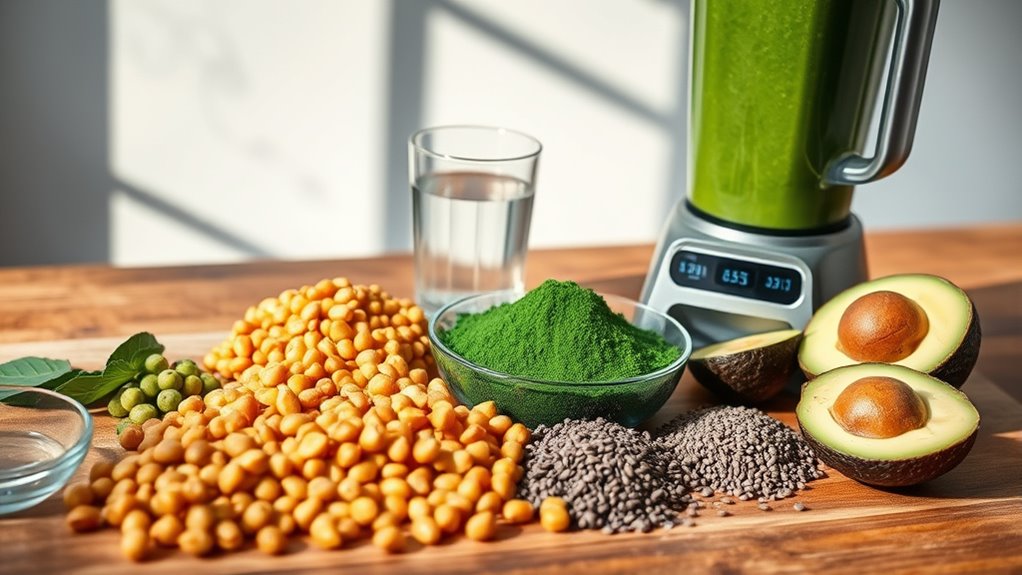
Plant-based protein supplements and powders offer convenient options for boosting your intake. You can choose from popular sources like pea, rice, and hemp protein, each with different protein levels. Learning how to incorporate these into your meals helps maximize their benefits during intermittent fasting.
Popular Plant-Based Options
If you’re looking to boost your protein intake on a vegan intermittent fasting plan, plant-based protein supplements and powders offer a convenient and effective solution. They fit well into your meal timing, helping you meet your protein goals during the 8-hour eating window. These options are portable, quick to prepare, and versatile, making them perfect for busy schedules. Here’s a quick comparison of popular choices:
| Protein Source | Flavor Options | Best For |
|---|---|---|
| Pea Protein | Vanilla, Chocolate | Post-workout shakes |
| Rice Protein | Unflavored, Vanilla | Smoothies |
| Hemp Protein | Nutty, Earthy | Meal replacements |
| Pumpkin Seed | Slightly nutty | Snacking |
| Soy Protein | Neutral, Sweet | Meal supplementation |
Choosing the right plant-based protein can optimize your meal timing and support your fasting goals effectively. Incorporating plant-based protein sources can also help ensure you’re getting a complete amino acid profile on a vegan diet. Additionally, selecting high-quality protein supplements can maximize absorption and nutritional benefits. Furthermore, understanding the amino acid profile of different plant proteins can help you make more informed choices to meet your dietary needs. Being aware of your protein quality is essential for maintaining muscle mass and overall health during intermittent fasting.
Protein Content Comparison
When choosing protein supplements for your vegan intermittent fasting plan, it’s important to compare their protein content per serving to guarantee you’re meeting your daily goals. Plant-based powders like pea, rice, and hemp offer varying protein amounts—usually between 15-25 grams per serving. Dairy alternatives such as soy protein provide higher protein levels comparable to animal-based proteins, making them excellent options. While animal-based proteins are typically more concentrated, vegan powders often combine different plant sources to improve amino acid profiles. Always check the nutrition labels to ensure you’re getting enough protein without excess calories or additives. Additionally, selecting high-quality essential oils can enhance relaxation and well-being during your fasting routine. Understanding market trends can also help you choose supplements that align with current innovations and consumer preferences in plant-based nutrition. Incorporating tuning techniques from automotive modifications can be a fun way to stay motivated and improve focus during your fasting periods. Choosing supplements with higher protein content helps support muscle maintenance and overall satiety during your fasting window, so compare carefully to optimize your intake. Recognizing the importance of amino acids can further improve your supplement choices and ensure a balanced plant-based protein intake.
Usage and Incorporation
Incorporating vegan protein powders into your intermittent fasting routine requires some strategic planning to maximize their benefits. Focus on meal timing to guarantee you consume protein when your body can best utilize it, such as during your eating window. This not only supports muscle maintenance but also enhances fasting benefits by stabilizing blood sugar levels. To optimize intake, consider the following options:
| Protein Source | Best Timing | Notes |
|---|---|---|
| Pea Protein | Post-fast | Easily digestible, supports recovery |
| Brown Rice Protein | Mid-meal | Complements amino acid profile |
| Hemp Protein | At meal start | Adds fiber and healthy fats |
Vegetables With Unexpected Protein Content
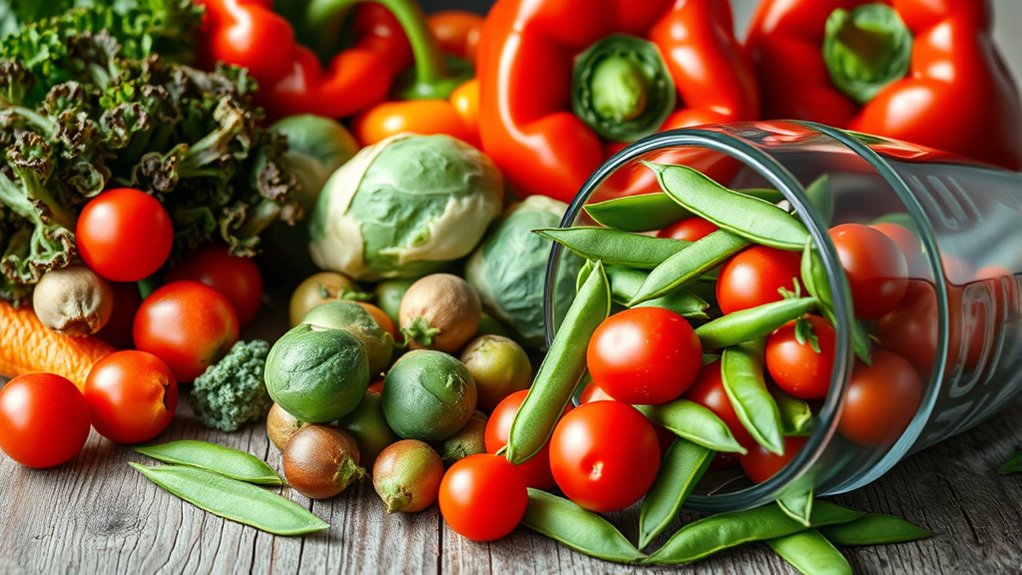
You might be surprised to learn that certain vegetables pack a protein punch. Leafy greens like spinach and kale, cruciferous veggies such as broccoli, and root vegetables like carrots all contribute more protein than you might expect. Incorporating these into your meals can boost your intake while keeping your diet vibrant and diverse. Additionally, plant-based ingredients like legumes and seeds can further enhance your protein intake on a vegan diet. Recognizing the nutritional density of various vegetables allows for more strategic meal planning that supports your health and sustainability goals. Using cooking techniques such as steaming or sautéing can help preserve their protein content and maximize nutrient absorption.
Leafy Greens Power
Many people are surprised to learn that leafy greens pack a notable amount of protein, making them a valuable addition to a vegan intermittent fasting plan. Kale, for example, blends well into smoothies, boosting protein without extra calories. Spinach salads provide a nutrient-dense, low-calorie way to increase your daily protein intake. These greens are not only rich in vitamins and minerals but also contain surprising protein levels that support muscle repair and overall health. Incorporating kale smoothies into your routine makes it easy to enjoy their benefits, especially during your eating window. Similarly, adding spinach to salads or wraps enhances both flavor and protein content. Leafy greens are versatile, accessible, and contribute considerably to your plant-based protein goals on a 16:8 fasting schedule. Additionally, their high nutritional content helps maximize the benefits of your fasting and vegan diet.
Cruciferous Veggie Proteins
While leafy greens offer a surprising amount of protein, another group of vegetables stands out for their nutritional punch—cruciferous vegetables. These veggies not only provide essential vitamins but also deliver unexpected protein content, making them a valuable addition to your vegan intermittent fasting plan. Here are some cruciferous veggie benefits and ideas for incorporating them into your diet:
- Broccoli: Use in salads or stir-fries for a crunch and protein boost.
- Brussels Sprouts: Roast or sauté as a side dish packed with nutrients.
- Cauliflower: Blend into soups or rice for versatility.
- Kale: Add to smoothies or salads for extra nutrients and protein.
Exploring cruciferous veggie recipes helps maximize their benefits and keeps your meals diverse and satisfying on a vegan diet.
Root Vegetables Benefits
Root vegetables often surprise with their protein content, making them a valuable addition to a vegan intermittent fasting plan. They’re rich in root vegetable nutrition, offering essential vitamins, minerals, and fiber alongside unexpected protein amounts. Incorporating root vegetables into your diet can enhance your root vegetable recipes, providing variety and nourishment. For example, carrots, beets, and parsnips contain more protein than you might assume, supporting muscle maintenance and satiety during your fasting window. Their versatility allows you to prepare them in many ways—roasted, steamed, or blended into soups—without sacrificing flavor or nutrition. Including these vegetables not only boosts your overall nutrient intake but also helps you meet your protein goals naturally, making them an excellent vegan protein source during your 16:8 fasting routine.
Combining Protein Sources for Complete Nutrition
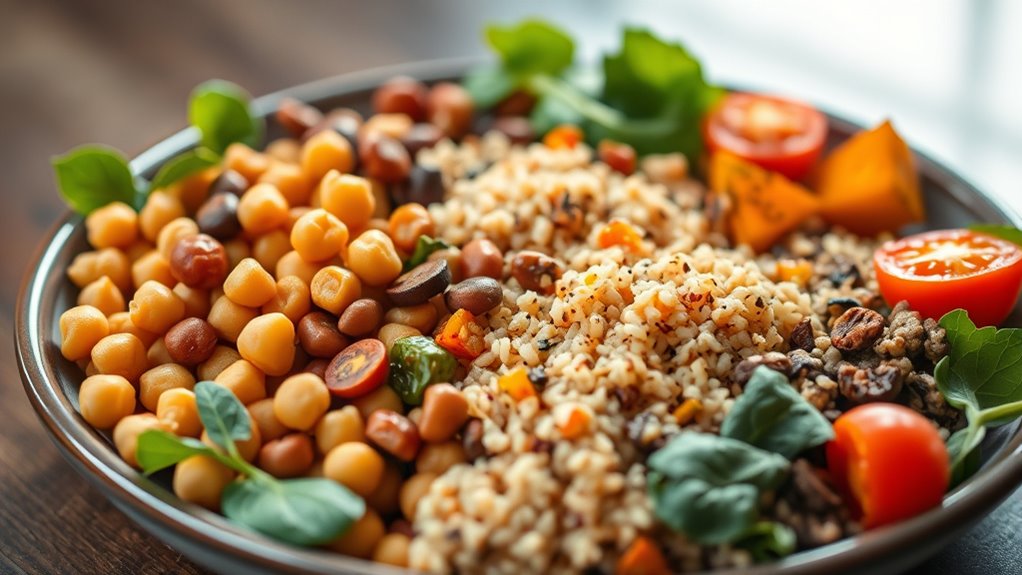
Combining different plant-based protein sources guarantees you get all essential amino acids for complete nutrition, especially during intermittent fasting. To optimize your intake, consider effective protein pairing strategies that include animal-based alternatives when possible. Here are some tips:
- Mix legumes with grains, like lentils and rice, for complementary amino acids.
- Incorporate nuts and seeds with vegetables to boost protein quality.
- Use plant-based protein powders alongside meals for added amino acids.
- When available, include animal-based alternatives like eggs or dairy for a complete protein profile.
Frequently Asked Questions
How Do I Ensure Adequate Protein Intake During Intermittent Fasting?
To guarantee you get enough protein during your fasting window, focus on smart meal planning with nutrient-dense foods like beans, lentils, tofu, and tempeh. Incorporate variety to cover all amino acids. If needed, consider supplement options like vegan protein powders to meet your daily targets. Stay consistent with your eating schedule, and you’ll maintain muscle and energy levels without breaking your fast.
Are There Vegan Protein Sources Suitable for Post-Workout Recovery?
Post-workout recovery requires powerful, protein-packed options. You can prioritize plant-based protein powders or vegan protein smoothies, which deliver dense nutrition and aid muscle repair. These sources are specifically suitable because they provide essential amino acids needed after exercise. By choosing these plant-powered options, you support your recovery process, fueling your fitness goals while staying true to your vegan lifestyle with vibrant, versatile, and valuable vegan protein sources.
Can I Meet My Daily Protein Needs Solely Through Plant-Based Foods?
Yes, you can meet your daily protein needs solely through plant-based foods. Focus on meat alternatives like tofu, tempeh, and seitan, which are rich in protein. Incorporate dairy substitutes such as soy or almond yogurt, and add legumes, quinoa, nuts, and seeds to your meals. These options provide diverse amino acids, helping you maintain a balanced diet while sticking to your vegan lifestyle.
What Are the Best Plant-Based Protein Sources for Muscle Building?
Power up with plant-based protein sources perfect for muscle building! Tofu varieties like silken or extra firm pack a punch, providing essential amino acids. Lentil dishes deliver dense doses of protein and fiber, fueling your gains. Incorporate these into your meals to maximize muscle growth while sticking to your vegan lifestyle. Prioritize variety and volume, and you’ll build strength sustainably and successfully.
How Can I Diversify My Vegan Protein Sources to Prevent Dietary Boredom?
To prevent dietary boredom, focus on diversifying your vegan protein sources by exploring different foods like lentils, chickpeas, tofu, tempeh, and edamame. Incorporate a variety of grains, seeds, and nuts to boost meal variety and flavor enhancement. Experiment with herbs, spices, marinades, and sauces to make each meal exciting. This approach keeps your diet interesting, guarantees balanced nutrition, and helps you stay motivated on your vegan journey.
Conclusion
By incorporating a variety of plant-based proteins like legumes, nuts, grains, and vegetables, you can easily meet your nutritional needs during your 16:8 fasting window. Did you know that soy contains all nine essential amino acids, making it a complete protein? Embracing diverse sources not only enhances your diet but also supports muscle maintenance and overall health. Stay intentional with your choices, and you’ll thrive on your vegan intermittent fasting journey.

